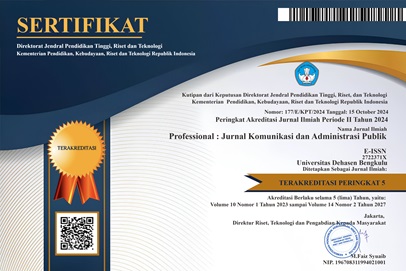Perubahan Perilaku Masyarakat Dalam Menghadapi Transformasi Digital Dalam Penyiaran Televisi (Studi Kasus Mengenai Kebiasaan Baru Masyarakat Di Desa Cingcin Dalam Menyikapi Digitalisasi Penyairan Televisi)
Abstract
The purpose is to investigate the changing behavior of people in Cingcin Village in the face of digital transformation in television broadcasting. The research method used is qualitative, with data collection through field studies, observations, and interviews. The results revealed that the shift from analog to digital broadcasting has affected people's habits of enjoying television programming. There are variations in preferences for accessing television content, with some people preferring digital platforms because of ease of access, while others remain loyal to conventional television because of better image and sound quality. Besides, there are changes in social interaction, with some people watching more often with friends and family, while others prefer watching alone. A shift in the culture of watching television has also occurred, where the focus is now more fragmented and not just focused on the main time. The results also show that the residents of Cingcin Village have adopted a new habit in the face of digital television broadcasting. However, better infrastructure, education, and content diversification are needed to facilitate this transition. Better mobile application development and sustained analysis and monitoring are also needed to understand behavioral changes in deeper societies. Thus, the study provides valuable insights into how rural communities adapt to technological developments in television broadcasting and offers a number of suggestions for increasing the adoption of digital technology among indigenous populations.
Downloads
Copyright (c) 2024 Alif Putra Rinidji, Dasrun Hidayat

This work is licensed under a Creative Commons Attribution-ShareAlike 4.0 International License.





